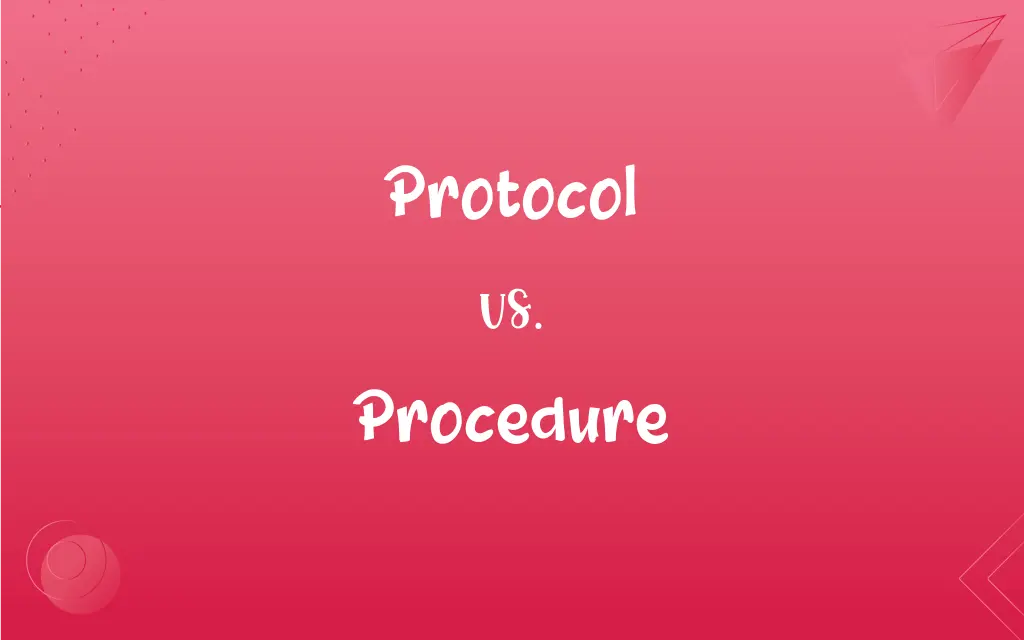Protocol vs. Procedure: What's the Difference?
Edited by Aimie Carlson || By Harlon Moss || Published on January 17, 2024
A protocol is a set of formal rules or standards, while a procedure is a series of actions conducted in a certain order or manner.

Key Differences
Protocols are formal guidelines or systems of rules, often established by an authority, whereas procedures are specific methods or steps followed to accomplish a task or operation.
Protocols are generally broader, setting standards or rules that can govern multiple procedures. In contrast, a procedure is a sequence of actions or steps tailored to a particular activity or process.
Protocols often carry a sense of formality and are strictly adhered to, especially in diplomatic or official contexts. Procedures, while systematic, can be more flexible and adapted to specific situations.
Protocols are prevalent in fields like diplomacy, information technology, and science, setting out rules or customs. Procedures are more commonly associated with operational or practical activities, outlining how tasks are performed.
Protocols are implemented to ensure uniformity and standardization, often with strict enforcement. Procedures are implemented more as guidelines for effective and efficient task completion.
ADVERTISEMENT
Comparison Chart
Definition
Set of formal rules or standards
Series of actions conducted in a sequence
Application
Broad guidelines, often established by authority
Specific steps for particular tasks
Formality
Generally more formal and rigid
Can be flexible and adapted
Common Contexts
Diplomacy, IT, science
Operational activities, practical tasks
Purpose
Ensure uniformity and adherence to standards
Guide effective and efficient task completion
ADVERTISEMENT
Protocol and Procedure Definitions
Protocol
Formal etiquette in official settings.
Royal events have a very specific protocol.
Procedure
A series of actions in a particular order.
The surgical procedure requires great precision.
Protocol
A system of rules governing affairs.
The diplomatic protocol dictates how negotiations are conducted.
Procedure
A methodical way of doing something.
There's a specific procedure for evacuating the building.
Protocol
Established guidelines for processes.
The lab follows strict protocols for handling chemicals.
Procedure
A set of steps to accomplish a task.
The procedure for assembling the device is in the manual.
Protocol
Communication rules in information technology.
HTTP is a well-known protocol in web communications.
Procedure
A way to perform a task effectively.
Following the correct procedure ensures safety.
Protocol
Standards for scientific experiments.
Researchers must adhere to the protocol for accurate results.
Procedure
Operational process in business or industry.
The company has a strict hiring procedure.
Protocol
The forms of ceremony and etiquette observed by diplomats and heads of state.
Procedure
A manner of proceeding; a way of performing or effecting something
Standard procedure.
Protocol
A code of correct conduct
Safety protocols.
Academic protocol.
Procedure
A series of steps taken to accomplish an end
A medical procedure.
Evacuation procedures.
FAQs
Are procedures the same in every context?
No, procedures can differ based on the task and context.
What is a protocol?
A set of formal rules or guidelines.
What is a procedure?
A series of steps followed to complete a task.
Is protocol more about rules or actions?
More about rules and standards.
Can procedures be modified?
They can be adapted to suit different situations.
Where are protocols commonly used?
In diplomacy, IT, and scientific research.
Do procedures have to be detailed?
Yes, they usually provide detailed steps.
Can a protocol include several procedures?
Yes, one protocol can govern multiple procedures.
Are protocols legally binding?
In some contexts, like international agreements, they can be.
Can protocols vary between organizations?
Yes, different organizations may have their own protocols.
Do protocols require strict adherence?
Generally, they do, especially in formal settings.
Is procedure related to a sequence of actions?
Yes, it's about the specific order of doing things.
Who establishes protocols?
Typically, an authoritative body or institution.
Are procedures followed in everyday life?
Yes, in many daily tasks and activities.
Can ignoring procedures lead to inefficiency?
Yes, it can compromise effectiveness and safety.
Are protocols subject to change?
They can evolve, though typically less frequently than procedures.
What is an example of a procedure?
A medical operation or emergency evacuation process.
Is a procedure a part of a protocol?
It can be, as protocols often encompass various procedures.
Do protocols apply to specific tasks?
They apply more broadly, often to multiple tasks.
How important is protocol in diplomacy?
Extremely important for maintaining respect and order.
About Author
Written by
Harlon MossHarlon is a seasoned quality moderator and accomplished content writer for Difference Wiki. An alumnus of the prestigious University of California, he earned his degree in Computer Science. Leveraging his academic background, Harlon brings a meticulous and informed perspective to his work, ensuring content accuracy and excellence.
Edited by
Aimie CarlsonAimie Carlson, holding a master's degree in English literature, is a fervent English language enthusiast. She lends her writing talents to Difference Wiki, a prominent website that specializes in comparisons, offering readers insightful analyses that both captivate and inform.







































































